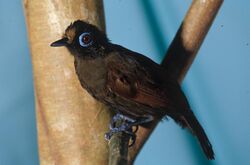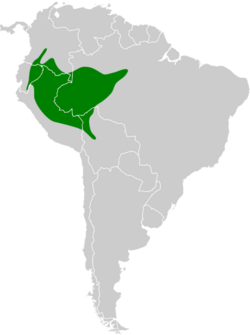Biology:Hairy-crested antbird
| Hairy-crested antbird | |
|---|---|

| |
| Scientific classification | |
| Domain: | Eukaryota |
| Kingdom: | Animalia |
| Phylum: | Chordata |
| Class: | Aves |
| Order: | Passeriformes |
| Family: | Thamnophilidae |
| Genus: | Rhegmatorhina |
| Species: | R. melanosticta
|
| Binomial name | |
| Rhegmatorhina melanosticta (Sclater, PL & Salvin, 1880)
| |

| |
The hairy-crested antbird (Rhegmatorhina melanosticta) is a species of bird in the family Thamnophilidae. It is found in Bolivia, Brazil , Colombia, Ecuador, and Peru. Its natural habitat is subtropical or tropical moist lowland forests.
The hairy-crested antbird is a specialist ant-follower that relies on swarms of army ants to flush insects and other arthropods out of the leaf litter.[2][3]
The hairy-crested antbird was described by the English ornithologists Philip Sclater and Osbert Salvin in 1880 and given the binomial name Pithys melanosticta.[4] The present genus Rhegmatorhina was introduced by the American ornithologist Robert Ridgway in 1888.[5] The specific epithet melanosticta is from the Ancient Greek melanostiktos meaning "black-spotted". It combines melas meaning "black" and stiktos meaning "spotted".[6]
References
- ↑ BirdLife International (2016). "Rhegmatorhina melanosticta". IUCN Red List of Threatened Species 2016: e.T22701895A93853406. doi:10.2305/IUCN.UK.2016-3.RLTS.T22701895A93853406.en. https://www.iucnredlist.org/species/22701895/93853406. Retrieved 12 November 2021.
- ↑ Zimmer, K.; Isler, M.L. (2018). "Typical Antbirds (Thamnophilidae)". in del Hoyo, J.; Elliott, A.; Sargatal, J. et al.. Handbook of the Birds of the World Alive. Lynx Edicions. https://www.hbw.com/node/52291.
- ↑ Willis, Edwin O. (1969). "On the behavior of five species of Rhegmatorhina, ant-following antbirds of the Amazon basin". Wilson Bulletin 81: 362–395. https://sora.unm.edu/sites/default/files/journals/wilson/v081n04/p0363-p0395.pdf.
- ↑ Sclater, Philip L.; Salvin, Osbert (1880). "On new birds collected by Mr. C. Buckley in Eastern Ecuador". Proceedings of the Zoological Society of London 1880 (2): 155–161 [160]. https://biodiversitylibrary.org/page/28522288.
- ↑ Ridgway, Robert (1887). "Descriptions of new species and genera of birds from the Lower Amazon". Proceedings of the United States National Museum 10 (660): 516–528 [525]. doi:10.5479/si.00963801.660.516. https://biodiversitylibrary.org/page/7485705. Although the title page gives the year as 1887, the volume was not published until 1888.
- ↑ Jobling, James A. (2010). The Helm Dictionary of Scientific Bird Names. London: Christopher Helm. p. 248. ISBN 978-1-4081-2501-4.
Further reading
- Coelho, Laís A.; Musher, Lukas J.; Cracraft, Joel (2019). "A multireference-based whole genome assembly for the obligate ant-following antbird, Rhegmatorhina melanosticta (Thamnophilidae)". Diversity 11 (9): 144. doi:10.3390/d11090144.
- Willson, Susan K. (2004). Obligate Army-ant-following Birds: a Study of Ecology, Spatial Movement Patterns, and Behavior in Amazonian Peru. Ornithological Monographs Number 55. American Ornithologists' Union. https://sora.unm.edu/sites/default/files/journals/om/om055.pdf.
Wikidata ☰ Q1274499 entry
 |


